Choosing the best wallets for crypto is crucial for managing and protecting your investments.
In this comprehensive guide, we’ll explore the top 8 best crypto wallets in 2023, from hardware wallets to software and online, also known as hot wallets.
We will also discuss the different types of wallets, their unique features, and the factors you should consider when choosing a wallet for your digital assets.
Always consider factors such as security, ease of use, and compatibility with your preferred cryptocurrencies when choosing a wallet.
1. Ledger Nano X – best crypto hardware wallet
The Ledger Nano X is a top-of-the-line hardware wallet designed to keep your digital assets secure. With Bluetooth connectivity and support for over 1,800 cryptocurrencies, this best crypto wallet is both user-friendly and versatile.
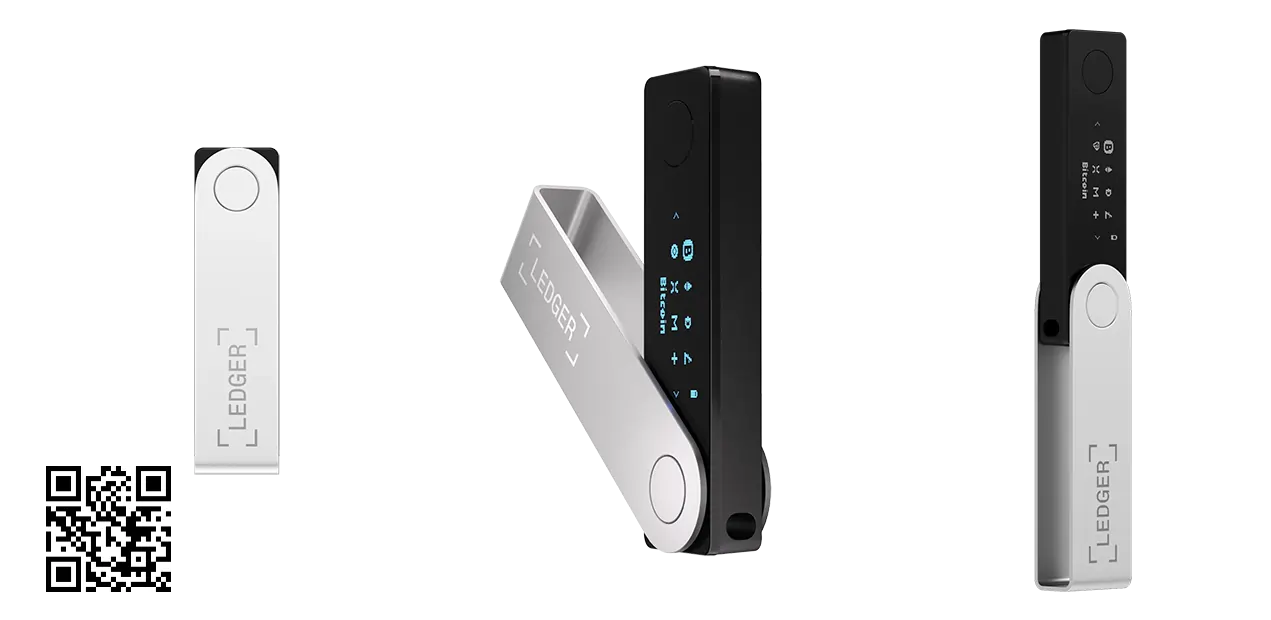
Its sleek design and state-of-the-art security features make it a popular choice among crypto enthusiasts.
Key features:
- Support for over 1,800 cryptocurrencies
- Bluetooth connectivity for easy management on the go
- State-of-the-art security features, including a secure element chip and custom operating system
✔️ BUY LEDGER NANO X
2. Ledger Nano S Plus – best wallet for crypto
The Ledger Nano S Plus is an upgraded version of the popular Ledger Nano S, offering increased storage capacity and an enhanced user experience. This best wallet for crypto is an excellent choice for those looking for a reliable hardware wallet at an affordable price.

Key features:
- Upgraded storage capacity for more apps and cryptocurrencies
- Enhanced user experience with an improved screen and button layout
- High level of security, thanks to the secure element chip and custom operating system
✔️ BUY LEDGER NANO S+
3. Ledger Nano Stax – best cold wallet for crypto
The Ledger Nano Stax is a next-generation hardware wallet that prioritizes security and usability. This best cold wallet for crypto features a large touchscreen display and support for a wide range of digital assets, making it an excellent choice for users who want a premium hardware wallet experience.
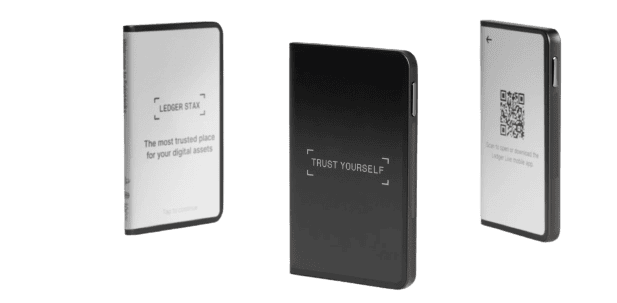
Key features:
- Large touchscreen display for easy navigation and control
- Support for a wide range of cryptocurrencies and tokens
- Advanced security features, including a secure element chip and custom operating system
✔️ BUY LEDGER NANO STAX
4. Trezor One and Model T
Trezor is a trusted name in the hardware wallet industry, known for its robust security features and support for numerous cryptocurrencies.
The Trezor wallet comes in two models: Trezor One and Trezor Model T, both providing top-notch security for your digital assets.
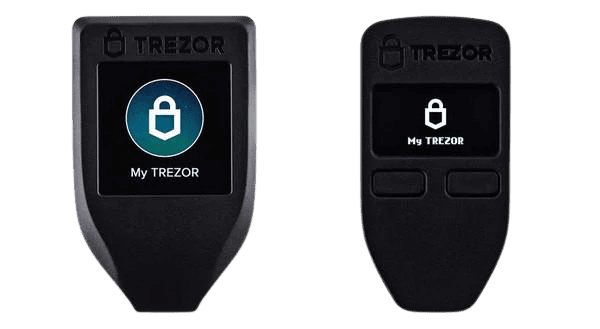
Key features:
- Support for a wide range of cryptocurrencies
- Robust security features, including PIN protection, passphrase support, and device recovery options
- User-friendly design and interface, making it easy for both beginners and experienced users
✔️ BUY TREZOR One
✔️ BUY TREZOR Model T
5. Trust Wallet – best decentralized crypto wallet
Trust Wallet is an exceptional decentralized crypto wallet known for its intuitive interface and commitment to providing a secure user experience.
As the official wallet for Binance, Trust Wallet supports an extensive range of cryptocurrencies, such as Bitcoin, Ethereum, and Binance Coin, as well as a multitude of ERC20 and BEP20 tokens.
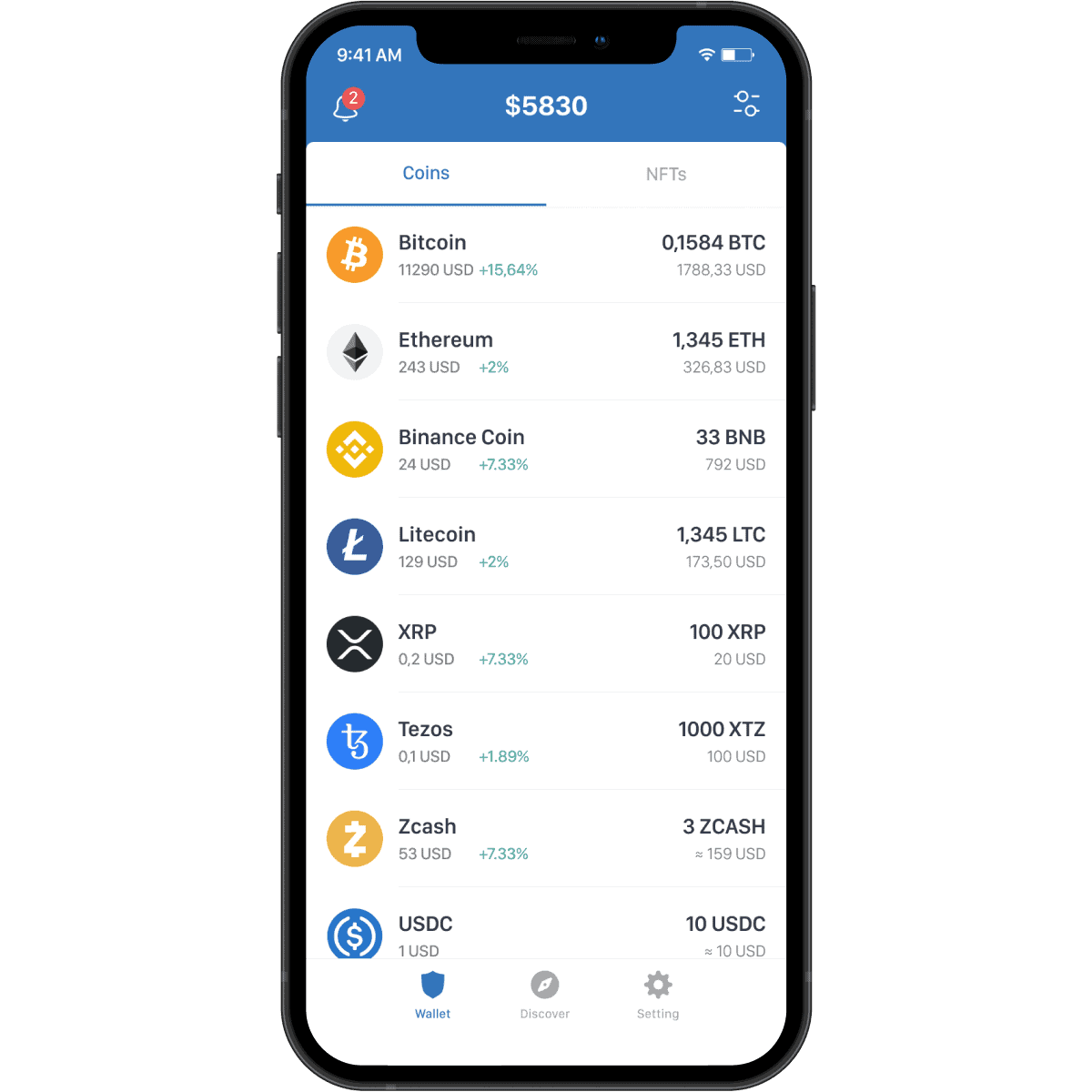
A significant advantage of Trust Wallet is its integrated decentralized exchange (DEX) feature, allowing users to swap and trade tokens directly within the wallet, eliminating the need for a centralized exchange.
Trust Wallet also offers seamless integration with various decentralized applications (dApps), granting users access to the ever-expanding world of decentralized finance (DeFi).
Key features:
- compatibility with multiple cryptocurrencies
- embedded DEX
- dApp integration
- robust security measures like biometric authentication and encrypted private keys for maximum protection.
✔️ LEARN MORE ABOUT TRUST WALLET
6. Exodus – best mobile crypto wallet
Exodus is a top-rated software crypto wallet that offers an intuitive interface, making it the best crypto wallet app for beginners and experienced users alike. With support for over 100 cryptocurrencies, this best mobile crypto wallet provides an excellent balance of security and functionality.
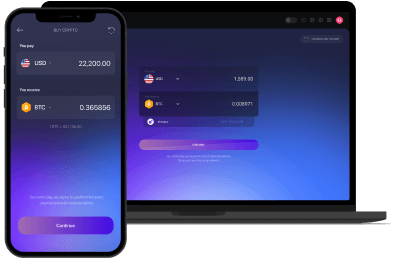
Key features:
- Support for over 100 cryptocurrencies
- Intuitive user interface and design, making it easy to manage and track your digital assets
- Built-in exchange feature, allowing users to trade cryptocurrencies directly within the app
✔️ DOWNLOAD EXODUS
7. Binance – best online crypto wallet
Binance is the best online crypto wallet for those who prioritize convenience and accessibility. As one of the largest cryptocurrency exchanges, Binance is the best crypto hot wallet offering a secure and user-friendly platform for managing and trading digital assets.
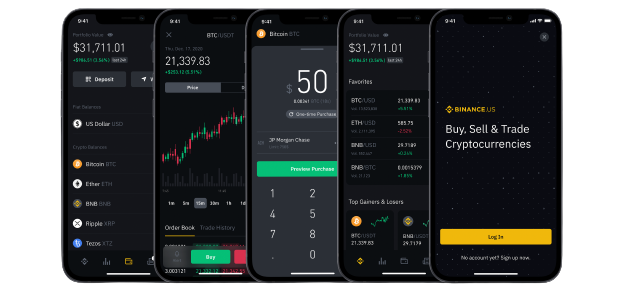
Key features:
- Accessible through a web browser or mobile app, providing convenience and flexibility.
- Integrated with the Binance exchange, allowing users to trade and manage their digital assets seamlessly
- Advanced security features, including two-factor authentication (2FA) and a multi-tier system architecture
8. MetaMask – best crypto wallet for NFTs
MetaMask is the best crypto wallet for NFTs, offering seamless integration with popular decentralized applications (dApps) and NFT marketplaces. This browser extension and mobile app is an excellent choice for users looking to explore the world of NFTs and DeFi.
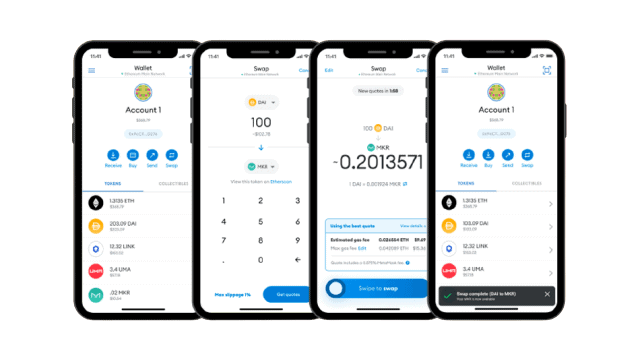
Key features:
- Browser extension available for Chrome, Firefox, and Brave, making it easily accessible
- iOS and Android mobile application
- Seamless integration with popular DeFi platforms and NFT marketplaces
- Support for Ethereum-based tokens, including ERC-20 and ERC-721
✔️ DOWNLOAD METAMASK
What is a crypto wallet
A cryptocurrency wallet, commonly referred to as a crypto wallet, is a digital tool that allows users to store, manage, and transact their cryptocurrencies.
It holds the user’s cryptographic keys: the public key, which is like an address that others can see and send coins to, and the private key, which is known only to the owner and is used to sign transactions and access their funds.
Having a crypto wallet is essential for anyone dealing with cryptocurrencies as it provides a secure and organized way to manage one’s crypto assets. It facilitates sending, receiving, and monitoring the balance of cryptocurrencies while ensuring that the user remains in full control of their private keys.
In choosing a crypto wallet, factors such as the type of cryptocurrency, the frequency of transactions, and the user’s technical expertise play a significant role. The array of wallets mentioned in this guide offers a glimpse into the various options available, catering to a range of preferences and requirements.
Types of crypto wallets
Hardware wallets
These physical devices store your private keys offline, providing the best security for your digital assets. Examples include Ledger and Trezor wallets. Hardware wallets are considered the most secure wallets for storing large amounts of cryptocurrency.
Software wallets
Software wallets are applications that run on your computer or mobile device, offering a balance of security and convenience. Exodus is a popular example. These wallets are suitable for daily transactions and managing smaller amounts of cryptocurrencies.
Online wallets
Online wallets are web-based platforms that store your private keys on the internet, making them easily accessible from any device. Binance is an example of an online wallet. While convenient, they are generally considered less secure than hardware or software wallets, so it’s essential to choose a reputable provider with robust security features.
Paper wallets
Paper wallets are physical documents containing your private and public keys, providing offline storage for your digital assets. These wallets, however, are less common and less convenient for everyday use. Paper wallets are mainly used for long-term, cold storage of cryptocurrencies.
Choosing the right crypto wallet
When selecting the best crypto wallet for your needs, consider the following factors:
Security
Security should be your top priority when choosing a crypto wallet. Look for wallets with robust security features, such as hardware wallets, which store your private keys offline and are less vulnerable to hacking.
Ease of use
Your wallet should be user-friendly, with an intuitive interface that makes it easy to manage your digital assets. Consider whether you prefer a mobile, desktop, or browser-based wallet, depending on your needs and preferences.
Compatibility
Make sure the wallet you choose supports the cryptocurrencies you want to store and manage. Some wallets specialize in specific cryptocurrencies or tokens, while others offer broader support for multiple digital assets.
Backup and recovery
Choose a wallet that offers backup and recovery options, allowing you to restore your wallet and access your digital assets in case of loss or theft.
Cost
While some wallets are free to use, others may charge fees for certain features or transactions. Consider your budget and the features you require when selecting a wallet.
By following this comprehensive guide, you’ll be well-equipped to choose the best crypto wallets in 2023.
With the right wallet, you can securely manage your digital assets and enjoy a seamless user experience with your crypto investments.
FAQ about the best crypto wallets
What is a crypto wallet?
A cryptocurrency wallet, commonly referred to as a crypto wallet, is a digital tool that allows users to store, manage, and transact their cryptocurrencies.
It holds the user’s cryptographic keys: the public key, which is like an address that others can see and send coins to, and the private key, which is known only to the owner and is used to sign transactions and access their funds.
What is the best crypto wallet for beginners?
Exodus is a popular choice for beginners, as it offers an intuitive interface and supports a wide range of cryptocurrencies. Additionally, its built-in exchange feature allows users to trade cryptocurrencies directly within the app.
Are hardware wallets worth the investment?
For those with a significant amount of digital assets or a long-term investment strategy, hardware wallets are worth the investment. They provide the highest level of security by storing your private keys offline, reducing the risk of hacking and theft. Ledger and Trezor are two reputable hardware wallet brands that offer a variety of models to suit different needs and budgets.
How do I choose the best crypto wallet for my needs?
When selecting a crypto wallet, consider factors such as security, ease of use, compatibility with your preferred cryptocurrencies, backup and recovery options, and cost. Evaluate your individual needs and preferences to determine which wallet best suits your requirements.
Can I use multiple crypto wallets?
Yes, you can use multiple crypto wallets to manage your digital assets. Some users prefer to use different wallets for different purposes, such as a hardware wallet for long-term storage and a software or online wallet for daily transactions.
What is the best crypto wallet for NFTs?
MetaMask is the best crypto wallet for NFTs, as it seamlessly integrates with popular decentralized applications (dApps) and NFT marketplaces. This browser extension is an excellent choice for users looking to explore the world of NFTs and DeFi.
How do I keep my crypto wallet secure?
To keep your crypto wallet secure, follow these best practices:
- Choose a reputable wallet with robust security features.
- Enable two-factor authentication (2FA) if your wallet supports it.
- Regularly update your wallet software to the latest version.
- Create a strong, unique password for your wallet and never share it with anyone.
- Store your private keys or recovery phrases in a safe and secure location, preferably offline.
- Avoid using public Wi-Fi networks when accessing your wallet, as they may be vulnerable to hacking.
- What should I do if my crypto wallet is hacked or compromised?
If you believe your crypto wallet has been hacked or compromised, take the following steps:
- Immediately transfer your digital assets to a new, secure wallet.
- Change your wallet password and enable 2FA if you haven’t already.
- Check for wallet software updates and ensure you’re using the latest version.
- Contact the wallet provider’s support team for assistance and guidance on the issue.
- Review your wallet’s security settings and best practices to prevent future compromises.










